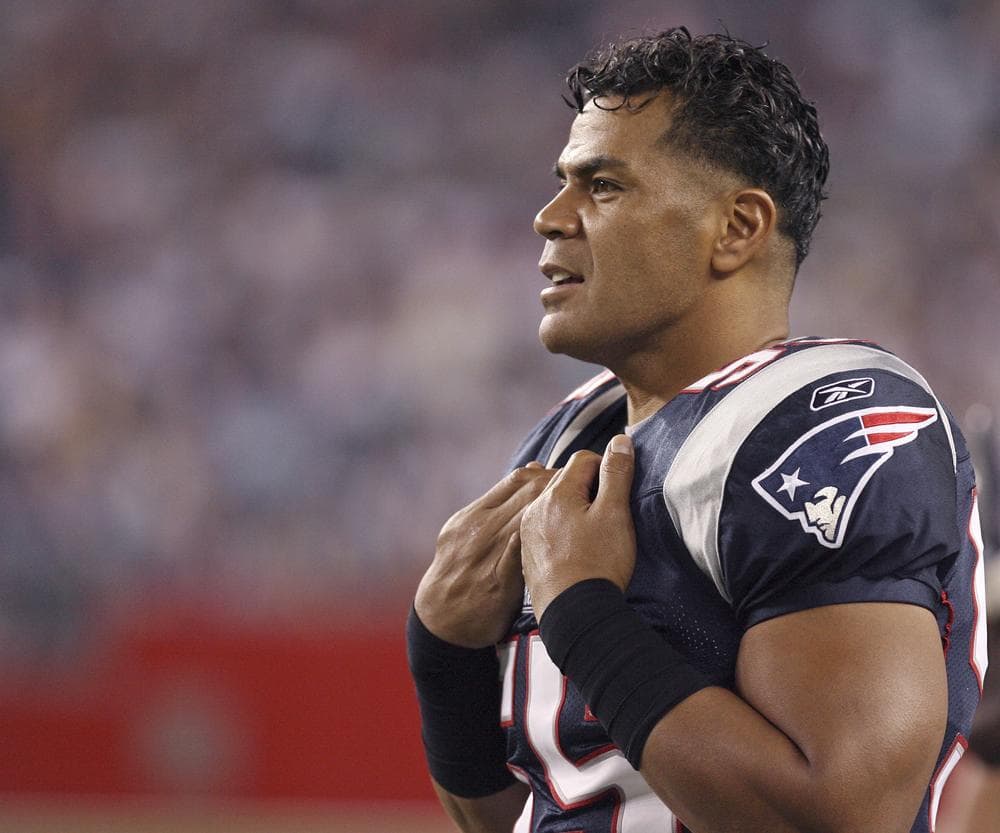Advertisement
In The News
Seau's Family Files Wrongful Death Suit
Resume
On Wednesday, the ex-wife and four children of Junior Seau filed a wrongful death suit against the National Football League and against the helmet manufacturer Riddell. Seau, who retired in 2009 after 20 seasons in the NFL, committed suicide last May. He was diagnosed posthumously with chronic traumatic encephalopathy.
Michael McCann, director of the University of New Hampshire’s Sports and Entertainment Law Institute and a legal analyst for Sports Illustrated, joined Bill Littlefield on Only A Game to discuss the lawsuit.
BL: The Seau suit was filed on behalf of a player who was an exceptionally accomplished and popular player. Will that be significant in terms of how the suit will be perceived and how the league will respond to it?
MM: I think it certainly gives the suit much more attention than it otherwise would have received if a less notable player brought it. But fundamentally the lawsuit is about the same set of issues that we've seen in other lawsuits related to concussions and, in this case, the death of a player, which is whether or not the NFL was negligent in the manner in which it communicated risks to players of playing in the league and whether in fact the league may have even concealed information. Those same issues are coming up in this case, although here, of course, we have a wrongful death lawsuit. A player has, in fact, died and the league could argue that the causation between him dying and him playing in the NFL and whatever they did wrong is too tenuous.
BL: How is Riddell likely to respond, and how will their response differ from the NFL's?
MM: Riddell's going to say, "Look, no helmet is perfectly safe. We don't market our helmets as perfectly safe. There was no deception. And you should have known by playing in the NFL that the helmet's the best we could do, but it's by no means a perfect fit."
BL: The league’s stated position is that the NFL is making various efforts to “promote the long-term health and safety of athletes at all levels.” Does the fact that Junior Seau was an active player until just three seasons ago undermine that assertion?
MM: It does on some level, the fact that he played as recently, as you said, three years ago. On the other hand, he did have a long career that traced back long before Roger Goodell was [NFL] commissioner and Goodell could argue that the league's policies on health have evolved over the course of Seau's career to the point that when he finished playing it was a safer game, but when he began it perhaps wasn't as safe as it needed to be. But the league will always argue that whatever it did wrong, the blame should be shared with the players' association, the union. [The NFL will argue] that the union had opportunities through collective bargaining to negotiate safer protocols, and they didn't.
BL: In terms of numbers, to me this is beginning to look like the class-action suits against the tobacco industry in the late 1990s. Are the suits likely to go to trial or do you suppose the NFL will try to settle [with] the 4,000-odd [plaintiffs]?
MM: I think the league's first tactic will be [to try to] get the cases dismissed through the preemption argument that these claims are barred by the collective bargaining agreement. If that fails, I think we would see efforts by the league to settle these claims. Perhaps we would see something of a global settlement where a fund is created that essentially pays victims of concussions and their families more money than they're currently receiving, and that those who opt into it waive away any claims against the league. Sort of like a worker's comp-type system is a possibility.
BL: And presumably that would be an agreement that would go forward into the future to cover future similar conditions.
MM: That's exactly right. It would have to go forward or at least to players who are currently in the league. Perhaps they could agree to some type of stipulation that limits the date in which you have to play in the league. But this is getting at the fact that the liability exposure to the NFL is potentially enormous and that while the league is extremely profitable, while owners make a lot of money, while their franchise values appear to be going up, something like this could radically change the economics of the game to the point where maybe owning isn't as lucrative as it once was because it's so expensive to field a team.
This segment aired on January 26, 2013.